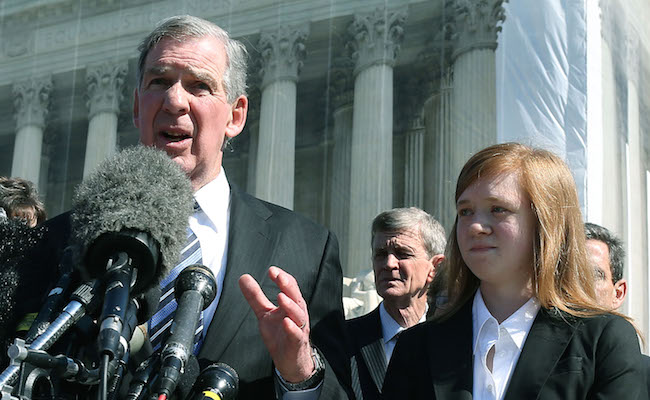
On Thursday, the Supreme Court upheld the affirmative action policy at the University of Texas again. They considered the same case brought forth by Abigail Fisher, in a move that says she was denied admission to the University of Texas based on her race. In 2013, the Supreme Court sent her case back to an appeals court. This time, they ruled definitively against her.
According to Politico, Justice Anthony Kennedy wrote the majority opinion, in which he said that University of Texas’ admissions policy does not violate the Constitution’s equal protection clause. However, he also said that the university must continually reevaluate its policy in accordance with the times. As Politico quotes his opinion:
“The record here reveals that the university articulated concrete and precise goals (for example) ending stereotypes, promoting ‘cross-racial understanding,’ preparing students for ‘an increasingly diverse workforce and society,’ and cultivating leaders with ‘legitimacy in the eyes of the citizenry’ — that mirror the compelling interest this Court has approved in prior cases,” wrote Justice Anthony Kennedy in an opinion joined by Justices Ruth Bader Ginsburg, Stephen Breyer and Sonia Sotomayor.
Justice Samuel Alito wrote the dissenting opinion, saying that UT had not adequately defined what purpose considering race in their admissions decisions served. He lamented the possibility that this ruling would empower other universities to use race as more of a consideration in admitting students.
Seven Supreme Court justices participated in the decision. Justice Elena Kagan recused herself, as she had worked on the case as U.S. solicitor general. The late Justice Antonin Scalia’s seat remains unfilled.
As the New York Times explains, The UT System’s admissions policy has garnered significant controversy over the years. In large part to ensure racial diversity, it guarantees admission for the top students at every high school in the state. It’s commonly known as the Top 10 Percent program, though the ranking cutoff for this policy varies by year. Abigail Fisher challenged the second part of the university’s policy, which fills the remainder of its class based on a holistic process that considers race as one factor.
The Huffington Post points out that when Fisher applied for admission to UT’s flagship campus in Austin, her application wasn’t strong enough for admission under either policy, because her GPA was too low. After Thursday’s ruling, Twitter users taunted her under the hashtag #StayMadAbby and #BeckyWithTheBadGrades. Below, a sampling of these tweets:
When the #SCOTUS upholds use of Affirmative Action at universities #StayMadAbby pic.twitter.com/IFwmZGAH2L
— philip lewis (@Phil_Lewis_) June 23, 2016
When Abby realizes it was incompetence and not race that held her back #beckywithbadgrades #staymadAbby pic.twitter.com/Yqn30zQHbE
— Moira Rose, J.D. (@mychericeamour_) June 23, 2016
#BeckyWithTheBadGrades thought she was getting in… 😂 #StayMadAbby @ReignOfApril @TheAtlantic pic.twitter.com/W9Bbtgll3O
— Brilliance💎 (@GreatBrilliance) June 23, 2016
You can read the entire Supreme Court opinion here.
(via Politico, New York Times and Huffington Post)
